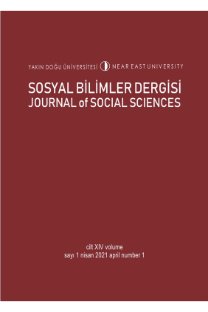Arap baharı sonrası dönemde avrupa birliği’nin orta doğu ve akdeniz politikalarının geleceği ve türkiye’nin rolü
Kuzey Afrika ve Orta Doğu’da yaşanan ayaklanmalar bölgeye yeni başlangıçlar ve değişimler getirmiştir. Avrupa Birliği(AB) dış politikasının bölge için önceki girişimleri başarısız olmakla beraber Arap Baharı olarak adlandırdığımız süreç, AB dış politikası adına zayıflıkları ve fırsatları aynı anda barındırmaktadır. Arap Baharı sonrası dönemde tarihi bağları ve coğrafi yakınlığı nedeniyle AB bölgenin dönüşümüne odaklanmalıdır. Bölgedeki sorunların sürdürülebilir çözümü AB’nin gündeminde her zaman önemli bir öncelik olmuştur. 1970’li yıllardan beri AB, Orta Doğu ve Kuzey Afrika’da bölgesel bir aktör olma arzusu göstermiştir. Fakat etkinliği tartışmalıdır. Bu çalışma AB’nin bölgede yaşanan değişimler doğrultusunda yenilenmesi gereken bölgesel politika- larının üzerinde durmaktadır. Bu bağlamda çalışmaya tarihsel arka planın incelenmesi ile başla- nılmıştır. Geçmişte AB her zaman bölgenin ekonomik gelişimi üzerinde durmuştur. Ancak, kurum- sal yapısının karmaşıklığı ve ortak bir dış politikaya sahip olamaması nedeniyle, bölgede AB’nin rolü sınırlıdır. Çalışmanın ana düşüncesi Orta Doğu ve Kuzey Afrika’da yaşanan değişim ve dö- nüşümlerin AB için siyasal liberalleşme öncelikli komşuluk politikaların oluşturulması adına bir fırsat olabileceğini savunmakla birlikte Türkiye ve AB ortaklığının bölgenin geleceği için çok önemli olduğunu vurgulamaktır.
The future of the european union’s middle east and mediterrenean polices and role of turkey after the arab spring
Recent uprising and demonstrations across the Middle East and North Africa have brought new beginnings and changes to the region. The EU (European Union)’s foreign policy has failed in its previous attempts toward the region. The Arab Spring exposes the number of weaknesses and opportunities for the EU’s foreign policy in the Middle East. The EU should focus on the problems of the region because of its proximity and historical ties. Sustainable solution of the problems in the Middle East has always been an important priority on the agenda of the EU. Since 1970’s, the Union started to show its desire to become an actor in the Middle East and North Africa. However the effectiveness of the EU is questionable. This study focuses on the need to renewed regional policies of the EU as well as analyzes historical background of the policies. In the past, the EU always focused on the economical development of the region. However, its role is limited because of its institutional weaknesses and lack of unity in its foreign and security policies. The fundamental arguments of this study are that these changes and transformations can be chance for rethinking of policies which covers political liberalization first and cooperation with Turkey is an essential for future of the EU in the Middle East and North Africa.
___
- “Arab Weakening boots Turkey’s Confidence, Strategic Comments”, The International Institute For Strategic Studies, Cilt 17, No. 36, 2011, s. 1-3.
- Barcelona Declaration and Euro-Mediterranean Partnership, Barselona, Avrupa Birliği, Kasım 1995, http://europa.eu/legislation_summaries/external_relations/ re lations_with_third_countries/mediterranean_partner_countries/r15001_en.htm. Euronews, “İsrail Doğu Kudüs’e 1300 Yeni Konut Onayı Verdi”, 9 Aralık 2010, http://tr.euronews.net/2010/11/09/israil-dogu-kudus-e-1300-yeni-konut-onayi- verdi/ Partnership for Democracy and Shared Prosperity with the Southern Mediterranean, Brüksel, Avrupa Komisyonu, Mart 2011, http://eeas.europe.eu/ euromed/docs/com2011_200_en.pdf,
- Altan, Mehmet, “Yunanistan Türkiye’ye Fark mı Atıyor?”, Star, 7 Kasım 2011.
- Altınbaş, Deniz, “Türkiye-AB-Orta Doğu Üçgeni”, Akademik Orta Doğu, Cilt 4, No. 2, 2010, s. 23-48.
- Bichi, Federica, “The Union for Mediterranean, or the Changing Context of Euro- Mediterranean Relations”, Mediterranean Politics, Cilt 16, No. 1, 2011, s. 3-19
- Biçer, Savaş, “Avrupa Birliği’nin Akdeniz Politikası ve Barselona Süreci”, Beril Dedeoğlu (der.), Dünden Bugüne Avrupa Birliği, İstanbul, Boyut Yayınları, s. 401-405.
- Bozdağlıoğlu, Yücel, “Modernity, Identity and Turkey’s Foreign Policy”, Insight Turkey, Cilt 10, No. 1, 2008, s. 55-75.
- Dokos, Thanos, “NATO’s Mediterranean Dialogue: Prospects and Policy Recommendations” ELIAMEP Policy Paper No 3, 2003.
- Hale, William, “Human Rights and Turkey’s EU Accession Process: Internal and External Dynamics, 2005-10”, South European Society and Politics, Cilt 16, No. 2, 2011, s. 323-333.
- Hollis, Rosemary, “Europe and the Middle East: Has the EU Missed its Moment of Opportunity?”, Ortadoğu Etüdleri, Cilt 2, No. 2, 2011, s. 33-56.
- Kahraman, Sevilay, “Turkey and the European Union in the Middle East: Reconciling or Competing with Each Other?”, Turkish Studies, Cilt 12, No. 4, s. 699-716.
- Karan, Ceyda, “Sarkozy’nin ‘Cheval’i ve Akdeniz Birliği”, Radikal, 16 Temmuz 2007.
- Kohen, Sami, “Türkiye Modeli Araplar için İyi mi, Kötü mü?”, Milliyet, 14 Ocak 2012.
- Kongar, Emre, ABD’nin Siyasal İslam’la Dansı, İstanbul, Remzi Kitabevi, 2012.
- Kutlay, Mustafa ve Osman Bahadır Dinçer, “Arap Baharı, Türkiye-AB İşbirliğini Yeniden Ateşler mi?”, Analist, Yıl 1, No. 3, s. 12-23.
- Nello, Susan Senior, The European Union. Economics, Policies and History, Berkshire, The McGraw-Hill Education, 2005.
- Perthes, Volker, “Europe and the Arab Spring”, Survival, Cilt 53, No. 6, 2011, s. 73-84.
- Robins, Philip, “Europe in the Middle East, or the Middle East in the Europe?”, B. A. Roberson (ed.), The Middle East and Europe, Londra ve New York, Routledge, 1998, s. 151-168.
- Schlumberger, Oliver, “The Ties that do not Bind: The Union for the Mediterranean and Future of Euro-Arab Relations”, Mediterranean Politics, Cilt 16, No. 1, 2011, s. 135-153.
- Schumacher, Tobias, “The EU and the Arab Spring: Between Spectatorship and Actorness”, Insight Turkey, Cilt 13, No. 3, 2011, s. 107-119.
- Solana, Javier, “A Secure Europe in a Better World, European Securtiy Strategy,” Brüksel, Avrupa Birliği, Aralık 2003.
- Tocci, Nathelie ve Jean-Pierre Cassarino, “Rethinking the EU’s Mediterranean Policies Post-1/11, Working Papers, Rome, Instituto Affari Internazionali, March 2011.
- Tüysüzoğlu, Göktürk, “Irak Bölünmenin Eşiğinden”, Radikal, 14 Ocak 2012.
- Youngs, Richard ve Ana Echagüe, “Europe, the Mediterranean, the Middle East and the Need for Triangulation”, The International Spectator, Cilt 45, No. 3, s. 27-39.
- ISSN: 1986-1303
- Yayın Aralığı: Yılda 2 Sayı
- Başlangıç: 2008
- Yayıncı: Yakın Doğu Üniversitesi
Sayıdaki Diğer Makaleler
Forecasting economic growth rate: The case of north cyprus
The financial outlook of Turkish social security system: Can social security deficits be alleviated?
Hedonik tüketim ile cinsiyet ve gelir değişkenleri arasındaki ilişkinin analizi
Digitalized memory, forgetting and the loss of social memory
DİLEK ÖZHAN KOÇAK, Orhan Kemal KOÇAK
